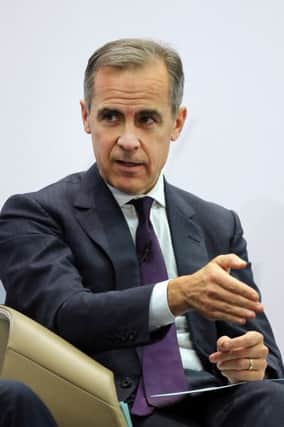Mark Carney: Brexit already costing £200m per week


At a private meeting with business leaders at the Davos World Economic Forum summit, Mr Carney said the UK had lost around £10 billion a year in lower growth since the June 2016 referendum, according to reports.
The Bank of England has not put a figure on the economic impact of Brexit to avoid being seen to interfere in political debate. This year’s growth forecast from the Office of Budget Responsibility of 1.4 per cent is down a third on the estimate from March 2016.
Advertisement
Hide AdAdvertisement
Hide AdLabour’s Wes Streeting, who has called for the UK to stay in the European single market after Brexit, said Mr Carney’s comments show “there is no Brexit dividend, only a Brexit deficit”.
It comes as the government seeks to “relaunch” Brexit negotiations with a major speech today by David Davis setting out the UK’s demands on trade after leaving the EU.
The Brexit Secretary will insist that the UK will be able to strike its own trade deals with countries like China and Brazil despite seeking to keep tariff-free access to the UK’s biggest market, Europe.
His comments will put the British negotiators on a collision course with Brussels, which says the UK cannot keep the benefits of the European customs union while having an independent trade policy.
The EU is also ruling out a “copy and paste” approach to existing trade deals between the single market and third countries during the two-year post-Brexit transition phase.
“As an independent country, no longer a member of the European Union – the United Kingdom will once again have its own trading policy,” Mr Davis is expected to say today.
“For the first time in more than 40 years, we will be able to step out and sign new trade deals with old friends, and new allies, around the globe.”
He will add: “Increasingly, we are trading with the key emerging markets of the world in Asia and the Americas.
Advertisement
Hide AdAdvertisement
Hide Ad“The UK’s fastest growing export markets between 2005 and 2014 included countries like China and Brazil.
“And we will be able to do so much more with them, when we are an independent trading nation, outside of the EU.”
Meanwhile, Chancellor Philip Hammond has suggested the UK will not finalise proposals for a trade deal with the EU before MPs vote on the Brexit withdrawal agreement.
His comments appear to put him at odds with Prime Minister Theresa May, who has said the UK can complete negotiating a free trade deal with the EU before Brexit day on 29 March, 2019, at which time a separate withdrawal and transition agreement is expected to be in place.
MPs won the right to have a “meaningful” vote on the withdrawal agreement after Tory Brexit rebels inflicted a defeat on the government last month.
But Mr Hammond’s admission that MPs are unlikely to know the proposed details of the future UK-EU relationship has led to accusations they will be voting “with their eyes closed”.
Asked if he expected the details of the future relationship to be laid out in full by the time Parliament votes on the withdrawal deal, the Chancellor told Bloomberg TV: “Probably not the full details, but we would expect the high level shape of the future relationship to be emerging by that time.”